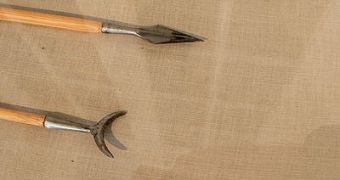Italian archaeologists have recently unearthed the fossilized skeletal remains of a 4,500-year-old warrior on a beach just South of the capital city of Rome. The man, who experts believe was killed by an arrow strike to the chest, was found by an aerial police patrol, of all things. As the authorities surveyed the area for possible places of archaeological interest, they observed a fissure in the ground and decided to further investigate it. Their idea yielded immediate results, as they found the well-preserved remains almost immediately. Reuters reports that the man was named Nello.
The fossils were discovered in May, on a beach that has had archaeologists buzzing for quite some time. “We thought [the body] was that of a Roman solider, but then the experts identified it as dating back to the third millennium B.C.,” Raffaele Mancino explained. He is part of the Italian police division overseeing the country's cultural heritage. The official also mentioned that six vases were found next to the corpse, which could mean that he was an important member of the society at the time of his death.
According to the official, the warrior lived within only a few hundred years from the famous Otzi man, a fossil that was discovered back in 1991, in the Italian Alps. The young man found on the beach was missing his legs, but researchers have not yet been able to determine whether he lost them in combat, or if his burial ground was invaded by wild animals over the years. However, the crack in the ground seems to point at the first theory.
Archaeologists are currently planning to continue their investigations of the region. They believe that the man's remains may be only the first awaiting to be discovered. They could represent the tip of the iceberg in a much larger necropolis. More than 4,500 years ago, building such cities of the dead was a common practice. If the body would have belonged to a Roman soldier, then the odds of him being buried along with many others would have been considerably slimmer.

 14 DAY TRIAL //
14 DAY TRIAL //